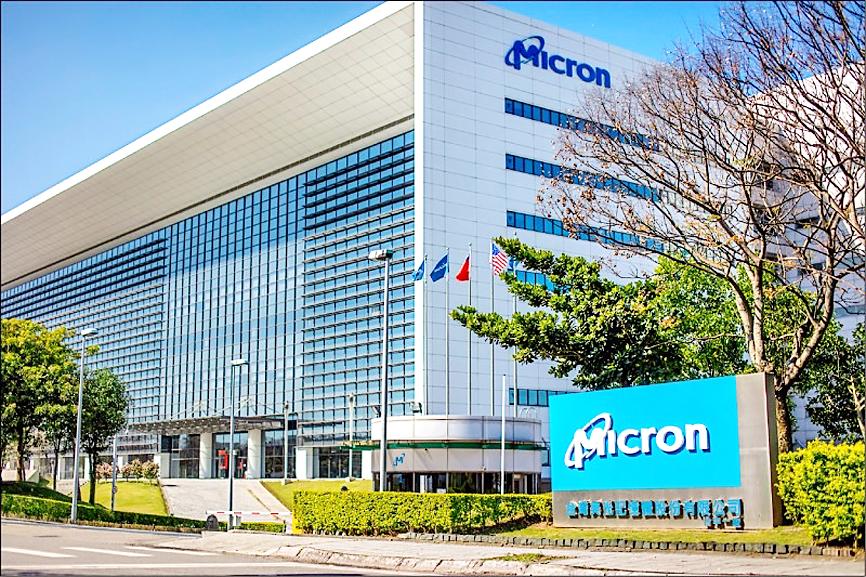Semiconductor stocks on Friday took a beating after a grim profit warning from Idaho-based Micron Technology Inc sparked fresh worries about the US’ earnings power as the country is potentially heading for a recession.
Despite a broader stock market rally, the Philadelphia Stock Exchange Semiconductor Index dropped 3.8 percent after Micron, the largest maker of memory semiconductors in the US, flagged that demand was cooling for chips used in computers and smartphones.
The index — which is home to US chip giants Advanced Micro Devices Inc and Nvidia Corp, as well as Micron — is down 38 percent this year.

Photo courtesy of Micron Technology Taiwan Inc
Historically, semiconductor stocks have been a key barometer for the broader stock market and economy. Chips are used in a broad range of industries that are important for growth: appliances, data centers, gaming and artificial intelligence.
If conditions are weak for chips, it raises questions about demand in other segments of the economy, which is a troubling harbinger for the stock market, said Matt Maley, a senior strategist at Miller Tabak + Co.
“We had nowhere near enough chips, and now the demand is falling,” Maley said. “What signal does it send? It highlights a growing concern that the slowdown we’re going through will turn into a recession.”
The semiconductor shortage, driven by factors on the demand and supply sides, has eased somewhat, but there is still limited production for certain chips used in vehicles and home appliances. Troubling reports from semiconductor companies ahead of their second-quarter earnings are spurring fears that demand would exceed supply for even longer.
“What this weakness indicates is that the economy is slowing, and there’s potential for a recession,” said Tim Ghriskey, a senior portfolio strategist at Ingalls & Snyder LLC. “Semis are a red flag because they’re really in everything. They’re so integral to everything that’s sold today. They’re the most rudimentary equipment, so this is a major negative for the economy.”
Fears of an impending global recession and rising levels of inflation are forcing consumers and businesses to rein in spending.
Worldwide PC shipments are on pace to decline 9.5 percent this year, research firm Gartner Inc said.
“The second half of the year is off to a rather inauspicious start following downbeat commentary from Micron, which had negative implications for smartphones, data centers and overall demand for consumer discretionary goods,” said Jim Dixon, a senior equity sales trader at Mirabaud Securities. “The disappointing guidance might be the prelude to an earnings recession.”
Adding to woes was a Digitimes Asia report that the world’s largest contract chipmaker, Taiwan Semiconductor Manufacturing Co (TSMC, 台積電), has seen its major clients cut their chip orders for the rest of this year.
Shares of TSMC dropped 4.73 percent on Friday and have fallen about 26.26 percent so far this year.

KEEPING UP: The acquisition of a cleanroom in Taiwan would enable Micron to increase production in a market where demand continues to outpace supply, a Micron official said Micron Technology Inc has signed a letter of intent to buy a fabrication site in Taiwan from Powerchip Semiconductor Manufacturing Corp (力積電) for US$1.8 billion to expand its production of memory chips. Micron would take control of the P5 site in Miaoli County’s Tongluo Township (銅鑼) and plans to ramp up DRAM production in phases after the transaction closes in the second quarter, the company said in a statement on Saturday. The acquisition includes an existing 12 inch fab cleanroom of 27,871m2 and would further position Micron to address growing global demand for memory solutions, the company said. Micron expects the transaction to

Nvidia Corp’s GB300 platform is expected to account for 70 to 80 percent of global artificial intelligence (AI) server rack shipments this year, while adoption of its next-generation Vera Rubin 200 platform is to gradually gain momentum after the third quarter of the year, TrendForce Corp (集邦科技) said. Servers based on Nvidia’s GB300 chips entered mass production last quarter and they are expected to become the mainstay models for Taiwanese server manufacturers this year, Trendforce analyst Frank Kung (龔明德) said in an interview. This year is expected to be a breakout year for AI servers based on a variety of chips, as

Global semiconductor stocks advanced yesterday, as comments by Nvidia Corp chief executive officer Jensen Huang (黃仁勳) at Davos, Switzerland, helped reinforce investor enthusiasm for artificial intelligence (AI). Samsung Electronics Co gained as much as 5 percent to an all-time high, helping drive South Korea’s benchmark KOSPI above 5,000 for the first time. That came after the Philadelphia Semiconductor Index rose more than 3 percent to a fresh record on Wednesday, with a boost from Nvidia. The gains came amid broad risk-on trade after US President Donald Trump withdrew his threat of tariffs on some European nations over backing for Greenland. Huang further

HSBC Bank Taiwan Ltd (匯豐台灣商銀) and the Taiwan High Prosecutors Office recently signed a memorandum of understanding (MOU) to enhance cooperation on the suspicious transaction analysis mechanism. This landmark agreement makes HSBC the first foreign bank in Taiwan to establish such a partnership with the High Prosecutors Office, underscoring its commitment to active anti-fraud initiatives, financial inclusion, and the “Treating Customers Fairly” principle. Through this deep public-private collaboration, both parties aim to co-create a secure financial ecosystem via early warning detection and precise fraud prevention technologies. At the signing ceremony, HSBC Taiwan CEO and head of banking Adam Chen (陳志堅)